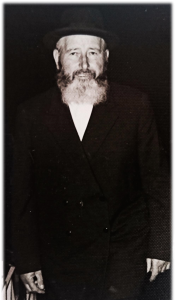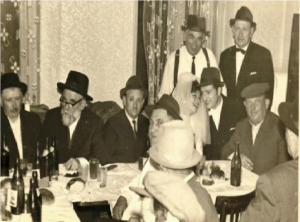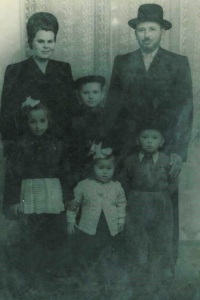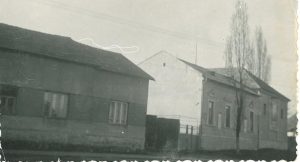 My father, my teacher and rabbi, Rabbi Yosef Meir Friedman, was born in 1910. He was born a year after the death of Rabbi of Spinka, the owner of the “Amor Yosef” and therefore was named after him. His father Jacob Friedman, a Spinka Hasid, worked as a shoemaker for a living. His family lived in the village of Sharet near Seilish, the burial place of Rabbi Baruch, the father of Baal HaTanya. The mother of little Josef Meir, Mrs. Feige, died of grief when she gave birth to her fourth child. His first memory was when he was just before the age of three at his mother’s funeral. He remembered his father Reb Yaakov crying bitterly during the funeral.
My father, my teacher and rabbi, Rabbi Yosef Meir Friedman, was born in 1910. He was born a year after the death of Rabbi of Spinka, the owner of the “Amor Yosef” and therefore was named after him. His father Jacob Friedman, a Spinka Hasid, worked as a shoemaker for a living. His family lived in the village of Sharet near Seilish, the burial place of Rabbi Baruch, the father of Baal HaTanya. The mother of little Josef Meir, Mrs. Feige, died of grief when she gave birth to her fourth child. His first memory was when he was just before the age of three at his mother’s funeral. He remembered his father Reb Yaakov crying bitterly during the funeral.
After the death of his mother Feige, his father married Mrs. Shayvi (Bat Sheva) who gave birth to additional children, among them Aunt Rohala and two other young men, who did not survive the terrible Holocaust.
Father had two big sisters. The eldest, Malka, married and lived in Brod and had two daughters, Itko, Hivi and a son. After her death, her husband married her younger sister, Sheindl. They had other children in common. In fact, her sister’s two daughters were the only ones who survived.
Josef’s father and stepmother died in his youth, and even before the Bar Mitzvah, he had to leave his home for lack of food and place. He went to a Yeshiva in Slovakia, the “Chatam Sofer and his disciples” Yeshiva, one of the branches of the Pressburg Yeshiva (=Bratislava). For his living he worked in the dairy at night and with the money he earned, he paid a private tutor to study math, German, writing and reading because he lacked it. As a child, he went only to the town’s heider.
In the yeshiva, he initiated the dining room after seeing that many people remained hungry after eating at the Taig. He organized the boys and they caused the landlords to donate. The money they used for shopping, and among them, they arranged turns for cooking. He taught them to cook, because he helped a lot at home and knew how to do it.
Before the holidays, they used to buy clothing for all the “clan” that lived with his sister Sheindel in Brod- her children, the children of her older sister and his brothers and sisters from his mother and the stepmother who died.
In short, Sheindl, who used to wear a Turban, was everyone’s mother.
Yosef Meir married an orphan before the war. They lived in the town of Rachov, where the famous rabbi, the Rabbi from Rachov, lived. He made a living from a bakery he owned.
With the outbreak of the war, Rabbi Yosef Meir was mobilized into the labor camps. After a while, he also reached the death camps in Mauthausen. After the liberation he was very sick and weak and barely arrived home. Father would say that on the way home he saw a piece of mirror on the floor. He was startled by his sight. When he came into his town, he discovered that almost all of his family had perished and only a few survived. The war refugees organized a communal home and Father taught them cooking. They treated him with devotion until his strength returned.
After the war in the Carpathians, the Jews who worked in labor camps during the war were the few who managed to survive and return after the war. They thought they would find a family, but in every family there was only one person and all the other Jews were burned in the Auschwitz camp.
Before the war, the Carpathians were in the territory of the Czech Republic or Hungary, and then it was possible to maintain a full Jewish life: (Jewish schools, synagogues, yeshivas). After the war, Soviet Russia conquered Hungary. They told them that Stalin was the hero who had killed Hitler in 1948. The Russian Jews would sing in Yiddish cheers “Liebenen zal der Haver Stalin” – “Long live Comrade Stalin.” The Russians who came to the area told the people that in Russia everything and everybody is equal….
At a certain point, the so-called “Iron Curtain” was closed. Father did not have time to leave and remained in Russia.
A few months after the closing of the” Iron Curtain”, our relatives (from Babi) Rabbi Yaakov Indik, the most prominent disciple of Rabbi Dushinsky, decided to do something, He understood that the Russian “paradise” was closer to hell. Then the Jews of Carpathia who survived the Holocaust would disappear from the map. The great problem was that the spiritual leaders did not return, except for one rabbi, one judge and eight ritual slaughterers for serving ten Jewish towns and villages, and thought that an action should be taken to save the Jews in the Carpathia.
He and the butcher, Moskowitz, my mother’s uncle, went through all the Carpathian cities to find people who had once attended yeshivas and invited them to a general meeting in the city of Khust. They managed to find forty yeshiva graduates, including my father. They told former yeshiva students that the Communists were people, who wanted to fight against Yiddishkeit and, therefore, everyone who studied in the yeshiva, should feel responsible for saving Judaism in their area. Rabbi Yaakov Indik suggested that each participant who is willing to be a community leader would remain for a few months to study slaughtering. Rabbi Yaakov Indik warned them that it would not be simple and that the authorities would cause them trouble because they do not like “dosim” – people who keep Torah and mitzvoth and therefore all yeshiva students must give their lives for saving Judaism..!
And then… the question was asked: “who was ready for the task?”
All the participants in the course passed the tests with the only survivor of the Holocaust – the Rabbi of Munkacs. When Rabbi Yosef Meir was examined, he made a very good impression on the rabbi. After a few days, Rabbi Moshe David Moskowitz came to the test. After he was examined, the rabbi asked him if he knew someone to match up with an important yeshiva student. He said he had a niece, who survived the Holocaust. This is how they will make a match with our mother. The wedding took place on Friday in the middle of winter. There were floods in the area, so that the groom had barely reached the wedding. After the wedding, the young couple lived in a village Litchik. My father moved from one Jewish house to another in nearby villages to slaughter chickens. At some point, the Jews did not feel secure in the villages and on the very first occasion moved to the cities. After a while, Reb Yaakov, who was examining the work of the shochatim everywhere, transferred from his position the shochet Yosef Meir Friedman to the largest Jewish city in the area – “Munkacs”. Since then, everyone has known him as “the slaughterer from Munkacs”.
In 1953, a plot was made against the Jewish doctors, as if they wanted to kill Stalin. This caused a wave of anti-Semitism throughout Russia. He put all the leaders of the Munkacs community, except my father, into prison. Within a few days, he had to take all the care of the community on his shoulders. In addition to slaughtering, he took care of the mikveh tahara, the calendar (which he wrote manually in his beautiful handwriting), the handling of religious articles – tefillin and mezuzah, kiddushin and gittin (together with the rabbi) etc. He arranged for us to receive old religious articles from Czernowitz and Leningrad.
Every year on Passover, they baked matzoth secretly for the whole area, and Father watched and took responsibility for baking the matzoth. One year they brought only the flour and each one had to bake for himself in his home for fear of danger.
A few years later, they released the leaders of the community, but they were already afraid to deal with the public. My father continued to lead the community until 1971, when we immigrated to Israel. There was something special in the community of Munkacs. Almost everywhere, in the Carpathian communities, there were disputes that divided the communities into several camps, but in the community of Munkacs, the largest community in the Carpathian region, there was peace. This was credited to my father, who used to say, “A quarrel needs two sides, I am not a side to any quarrel!”
One of the reasons they let us out of Russia was, that they thought that if my father left the community – it would fall apart without his leadership. But according to an explicit order from the Ribnitzer Rebbe, Abba prepared a substitute, who continued to guide the community until the last of the Jews of Munkacs left Russia and joined Jewish communities throughout the world.
In Israel, too, Father did not sit idly by. In fact, we never saw him sitting idle. He discovered that there were villages in Israel that operated according to “everyone is a butcher.” He began to go to five villages in the Tel-Mond area. He went from house to house to persuade the residents to start eating kosher. He was prepared to slaughter for them for the sake of eating kosher. They all had chicken coops. They told him that when they plucked feathers, they first threw the chickens into hot water, which made the chicken kosher. He undertook to pluck the feathers manually and did it with devotion. He also wrote mezuzot to everyone and explained to them that here is the Land of Israel and there is no need to be ashamed to set mezuzos in the gates of the houses. Thanks to him, many families in the villages had returned to live according to Torah and mitzvoth.
Jacob Friedman

A wedding in Munkacs with the rabbi

The whole family is photographed

The Spinka Synagogue and the Family House